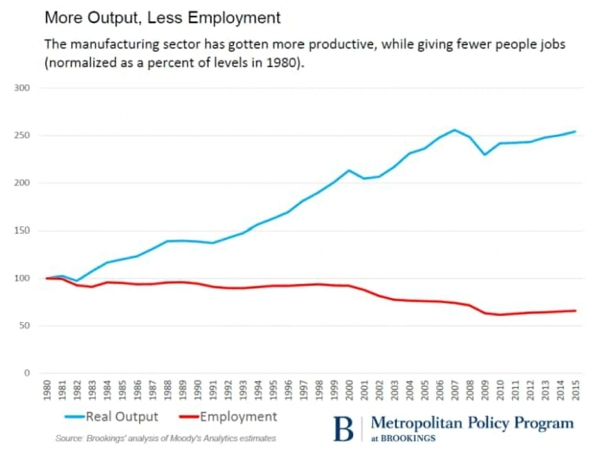Automation is a word that tends elicited a vicarial response. The fear of people losing their jobs to automated bots goes back to the early 1800s. At the time textile machinery was replacing workers and this led to the formation of the Luddites, a radical group which sought to physically destroy their mechanical replacements. Fast forward two centuries and the term Luddite has changed but the fear of losing jobs has not. Substitute the mechanical loom with Artificial Intelligence and we have a similar situation. However, the nebulas and amorphous nature of AI makes is difficult to identify what jobs are at risk of being overtaken by bots. Many people have tried to clarify this, and most recently it was John Oliver turn with his show Last Week Tonight.
For those not familiar with Last Week Tonight, it’s a weekly news satire on HBO. Each week John Oliver’s goal is to better inform his viewers on a specific topic as well as provide a healthy dose of humor. Think of it as something in-between a PSA and your typical late-night talk show. Past subjects have included Brexit, Multi-level Marketing, and Vaccines, and last week’s episode focused on automation and its looming effect on the workforce.
While I’m usually critical of satirical programs as a source of information, I feel like Oliver did a fairly good job of hitting some of the nuances in this subject.
Oliver started by pointing out the US’s output has more than doubled since 1980, even though the number of people employed in production has decreased.

The catalyst for this simultaneous rise in production and decrease in the workforce is automation, be that mechanical (robots on assembly lines) or digital (AI bots). While some people like to point the finger of blame at outsourcing when it comes to job loss, the truth is a lot of jobs are simply being automated.
“[T]he point is many of those jobs aren’t being stolen, they are disappearing. Machines are now doing them, and thanks to advances in AI and robotics, there are concerns that this sort of job loss could accelerate.”
Oliver went on to point out two things that often get overlooked when discussing automation and job loss.
1. Automation targets tasks, not jobs
This is an important distinction to make. AI excels in the area of repetitive tasks. For example, maybe there’s data that needs to be formatted into a monthly report. Or there are server logs that need to be viewed and classified. Or a caller needs to be directed to the right service desk for their issue. In each case, an AI bot could automate these tasks. The question for workers now becomes “is my job primarily repetitive tasks”. If the answer is in the affirmative, then there’s a high possibility of creative destruction occurring in your field.
However, automation doesn’t always hit who you think it will. Let’s look at two examples: lawyers and grocery clerks. On paper, most people would probably pick law as the profession that is more immune to automation, however, this isn’t the case.
The last decade has been hard on lawyers. Over time there’s become a large divide between the number of jobs available versus the number of law graduates. This isn’t because John Grisham over-romanticized the profession, resulting in an entire generation that wanted to practice law in the South. No, the blame can be placed on automation.
For first-year lawyers, a lot of their time has historically been doing things like document discovery; the act of manually searching through thousands of documents and pulling out pertinent information. In the case against Enron, there were half a million emails alone that were submitted into discovery. Once this information is distilled, it’s the job of the more senior lawyers to choose how to use it for their clients. This lengthy but necessary part of case preparation is now done on demand with the use of in-house search engines. An interesting side note is that the Enron emails are now open to the public and the dataset is often used to teach data scientist students how to train models to identify different topics of conversation.
So, if entry-level lawyers no longer have to spend the majority of their time reading through documents, then what do they do? Help write up basic legal agreements like wills and business formations? No, those tasks are automated as well. Tasks that AI can’t handle, like working with clients and giving sage advice is reserved for senior lawyers and partners. So instead, many of these first-year lawyers simply don’t get hired.
Compare this to grocery clerks. Almost any store has some level of automation in the form of self-checkouts. But this hasn’t resulted in a major decrease in the number of clerks working at a given store. Because running a check-out stand is only a portion of their responsibilities, and there are other valuable tasks they can perform. There are always aisles to mop, shelves to restock, and carts to bring in (unless it’s ALDI). Even if you automate things to an incredible degree like Amazon has at their Amazon Go stores, you still need a lot of other tasks to be performed. A clerk’s job is a large variety of tasks, many of which are physical, and that variety is armor against automation.
2. Jobs of the future will include things that we can’t now imagine
John Oliver referenced an example I often like to use. Imagine you go back about 150 years. At that time approximately 50% of people were farmers. If you were to tell the farmers of 1850 about 95% of those workers will lose their jobs to automation, they would naturally ask, “What will those people do instead?”. The answer is they will work on things that haven’t been invented yet. The truth is, many of us have jobs our parents had not heard of when they were our age, and likewise our children will probably have positions that would sound alien to us now. The thing to keep in mind is jobs often shift, they don’t just disappear altogether. Factories are automated by robots, but now there’s a greater need for mechanical engineers. AI takes over tasks that lawyers traditionally did, but now there’s a need for data scientists.
In addition to jobs shifting, new industries are created over time. I’ve experienced this first hand. At the time I received my undergrad, the term data scientist didn’t even have a Wikipedia entry. However, after reading a couple of books (Super Crunchers, and The Signal and the Noise) I realized data science was what I wanted to do. I looked up master’s programs, and at the time there was really only one. Fast forward to now and many universities offer dedicated bachelor’s programs in data science and machine learning.
3. One thing I wish John Oliver touched on: Augmenting vs automating
AI and automation are going to touch everyone’s job; the real question is will it completely take over that job, or simply liberate some aspect of it. This is an important distinction. For example, Microsoft Excel did not eliminate accountants. It’s a powerful tool, capable of automating many things. However, what it did do was allow accountants and financial analysts to get answers to more questions in a timely manner. In other words, it provided more value in their role. Put simply, employees need to ask, is automation making my work more valuable, or is it making my presence unneeded?
While most people have heard of the book, Race Against the Machine not that many people have heard the phrase “race with the machine”. Erik Brynjolfsson, the author of said book, points out in his Ted Talk (Race with the Machine), in this new machine age we are still figuring out the best way to use this AI technology. Our first reaction has been to simply let the machines do it all, however, a teamed approach is proving to have more value. He references the fact that although Deep Blue beat Kasparov in 1997, the best performance now comes from a team up of a human and a computer.
Last year Tesla’s Elon Musk similarly missed the mark when he tried to automate everything in their assembly lines. After production decreased, he finally had to admit to taking it too far and stated, “Humans are underrated”.

I think we likewise miss the mark when talking about self-driving trucks. We often speak about how AI will displace many if not all truck drivers. In actuality, drivers will most likely still be required to be in the cab (at the very least for legal reasons). If this is the case, then all AI has done for truckers is to make their job easier and safer, not obsolete.
4. Conclusion
We have a bad track record of understanding what jobs will be fully automated versus augmented. Everyone thought ATMs would put bank tellers out of work, and no one saw the impact AI would have on the law profession. What does automation really mean for people? It means that we need to keep an eye open to what change is happening, and we need to be more reactive to it. Overall, AI will improve the lives of many, making things cheaper, making things safer, and in many cases taking care of the most monotonous parts of our work. However, there’s always a cost, and it looks like this one comes in the form of employees having to be nimbler and more mindful of our careers.

